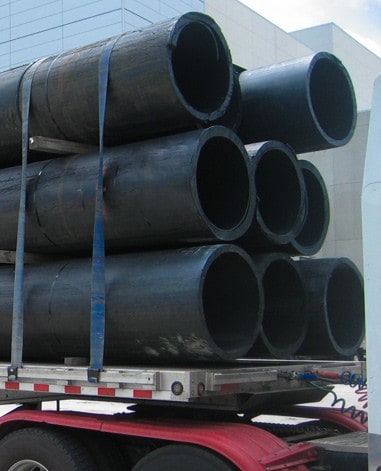American Plastics HDPE Pipe for Oilfield: Built for Harsh Conditions
Wiki Article
Recognizing the Key Conveniences of HDPE Pipeline for Water and Wastewater Administration
The usage of HDPE pipeline in water and wastewater management presents numerous advantages that merit factor to consider. Its outstanding resilience and lengthy life-span make it a preferred option for many jobs. Furthermore, the material's resistance to corrosion and chemical damage enhances its reliability in various environments. The benefits prolong past just long life and resistance. hdpe pipe fittings Midland TX. Exploring its cost-effectiveness and environmental effect exposes a lot more compelling reasons for its extensive fostering in modern-day facilitiesExceptional Sturdiness and Long Life

HDPE pipe attracts attention for its outstanding longevity and long life, making it a recommended option in water management systems. Created from high-density polyethylene, these pipes can withstand considerable pressure and stress and anxiety, guaranteeing dependable efficiency in time. Their durable nature permits them to withstand extreme environmental problems, consisting of temperature level fluctuations and soil activities, which can create other products to stop working.
The life expectancy of HDPE pipelines typically goes beyond half a century, supplying a cost-efficient remedy for districts and sectors alike. Furthermore, the material's lightweight buildings streamline installation, lowering labor costs and timeframes. This toughness lessens the need for frequent repairs or replacements, better enhancing its financial charm.
In water management applications, the dependability of HDPE pipelines means fewer disruptions and boosted solution continuity, making them indispensable to lasting infrastructure advancement. The combination of durability and long life strengthens HDPE's function as a cornerstone in reliable water management solutions.

Resistance to Rust and Chemical Damage
While lots of products catch corrosion and chemical damages with time, HDPE pipes display amazing resistance, making them suitable for numerous water monitoring applications. This strength stems from the molecular structure of high-density polyethylene, which is naturally non-reactive and does not rust like metals or degrade from exposure to rough chemicals. Therefore, HDPE is extremely efficient in atmospheres with hostile materials, such as wastewater systems that might contain acids, bases, and organic solvents.
Furthermore, HDPE pipelines can endure ecological variables such as soil acidity and saline problems, better boosting their suitability for diverse applications (Pipe Supplier American Plastics Midland). Their capability to keep structural honesty gradually lowers the risk of leakages and failings, which is essential in making certain the security and reliability of water circulation and wastewater management systems. Consequently, the resistance to corrosion and chemical damage substantially adds to the overall performance and longevity of HDPE piping services
Cost-Effectiveness and Financial Advantages
When considering the economic effects of water management systems, the cost-effectiveness of HDPE pipelines comes to be apparent. These pipes use reduced installation and upkeep prices contrasted to conventional materials like steel or concrete. Their lightweight nature simplifies transportation and installation, causing reduced labor expenses. Furthermore, HDPE pipes show a lengthy lifespan, typically going beyond half a century, which translates to fewer replacements and long-lasting cost savings.Additionally, the resistance of HDPE to rust and chemical damages decreases the requirement for costly repair services and substitutes. The pipes additionally support effective water circulation, minimizing energy prices connected with pumping systems. By alleviating leaks and water loss, HDPE pipes add to considerable financial benefits for municipalities and sectors alike. Overall, the first financial investment in HDPE piping plastic pex fittings can generate considerable monetary returns over the life expectancy of the water monitoring system, making it a sensible selection for lasting framework growth.
Ecological Sustainability and Decreased Effect

Versatility and Adaptability in Setup
Because of their one-of-a-kind residential properties, HDPE pipelines offer remarkable flexibility and adaptability in setup, making them appropriate for a variety of applications. Their lightweight nature enables easier handling and transportation, reducing labor expenses and installment time. HDPE pipes can be curved and shaped to fit different surfaces and task needs, which is specifically helpful in challenging environments.Furthermore, their resistance to deterioration and chemical damage permits installation in diverse setups without the demand for specialized protective coverings. The ability to fuse joints develops a constant, leak-free system, boosting the total stability and reliability of the installment. HDPE's versatility likewise accommodates ground motion, lowering the risk of damages in locations vulnerable to shifting soil. Overall, these attributes make HDPE pipelines not just versatile however also a preferred choice for water and wastewater administration systems.
Regularly Asked Concerns
Exactly How Does HDPE Pipeline Contrast to PVC in Water Monitoring Applications?
HDPE pipe provides premium adaptability, resistance read this to corrosion, and resilience compared to PVC. Its lighter weight helps with simpler installment, while its long life expectancy reduces substitute costs, making HDPE a recommended choice in water administration applications.What Is the Lifespan of HDPE Water Lines Under Regular Conditions?
Under normal problems, HDPE pipes can have a lifespan varying from 50 to 100 years. Their longevity and resistance to rust add to their long-lasting efficiency in numerous applications, making them a dependable selection for facilities.Are HDPE Pipes Recyclable After Their Service Life?
Yes, HDPE pipes are recyclable after their service life. Texas hdpe pipe manufacturer. They can be refined and repurposed into new items, substantially lowering environmental influence and advertising sustainability within the industry, making them an environment-friendly option for piping optionsWhat Is the Setup Refine for HDPE Piping?
The installation procedure for HDPE pipelines involves site prep work, trenching, pipe fusion or mechanical signing up with, backfilling, and stress testing. Correct techniques ensure a long lasting and efficient system for delivering water and wastewater properly.Can HDPE Pipeline Be Made Use Of for Both Drinkable and Non-Potable Water Solutions?
Yes, HDPE pipelines can be utilized for both safe and clean and non-potable water supply. Their flexibility, longevity, and resistance to corrosion make them ideal for different applications, ensuring safe and efficient transport of water in various contexts.Report this wiki page